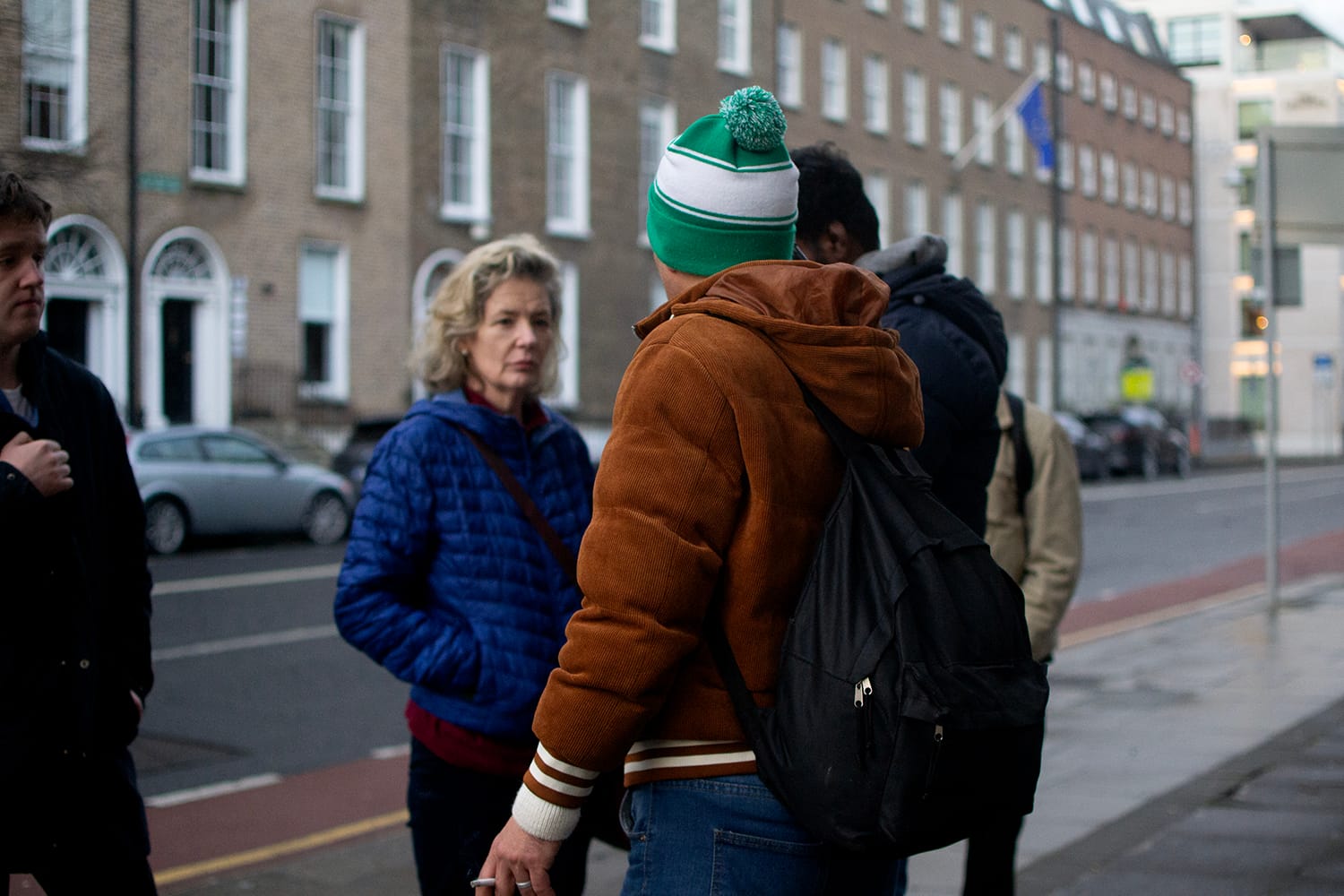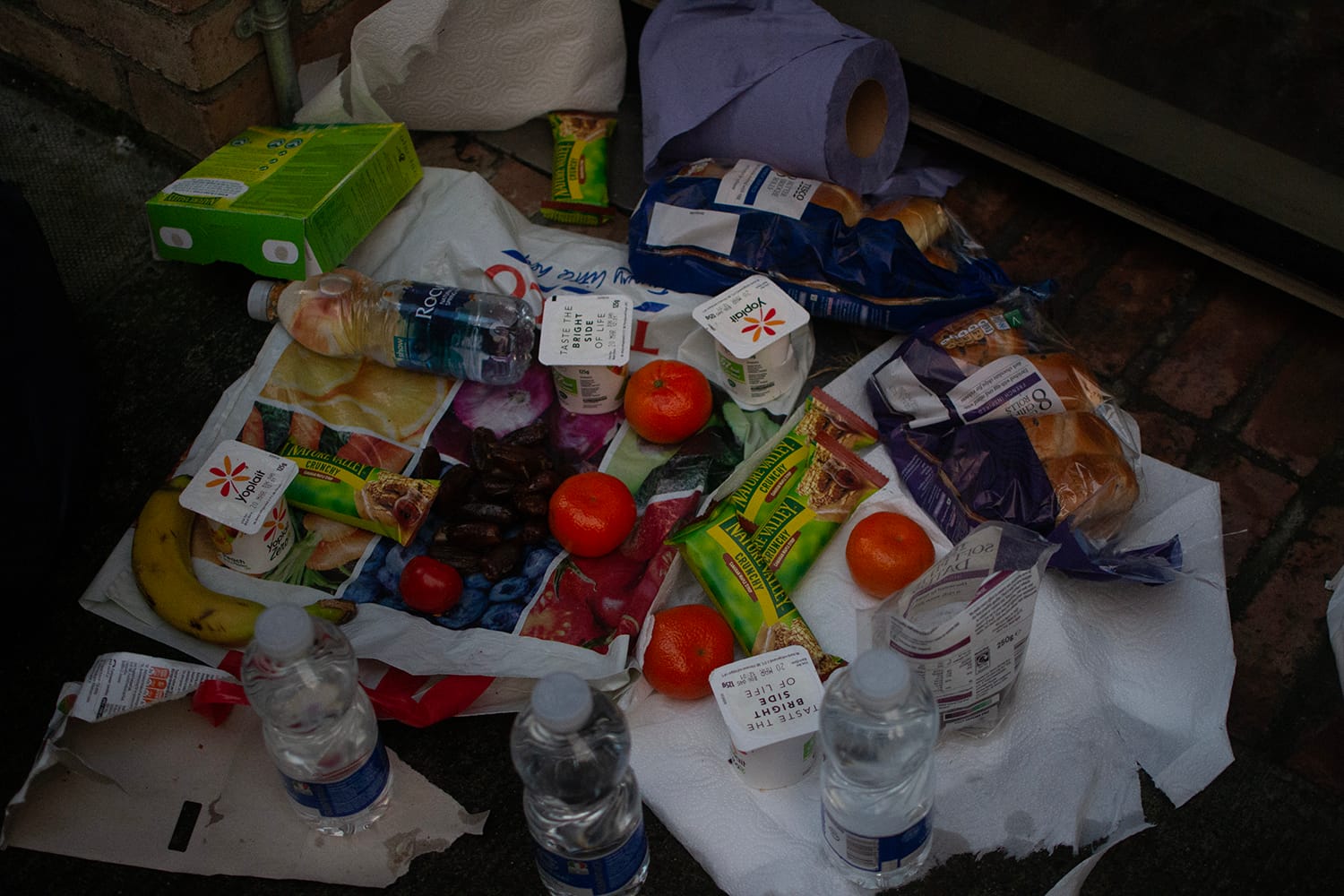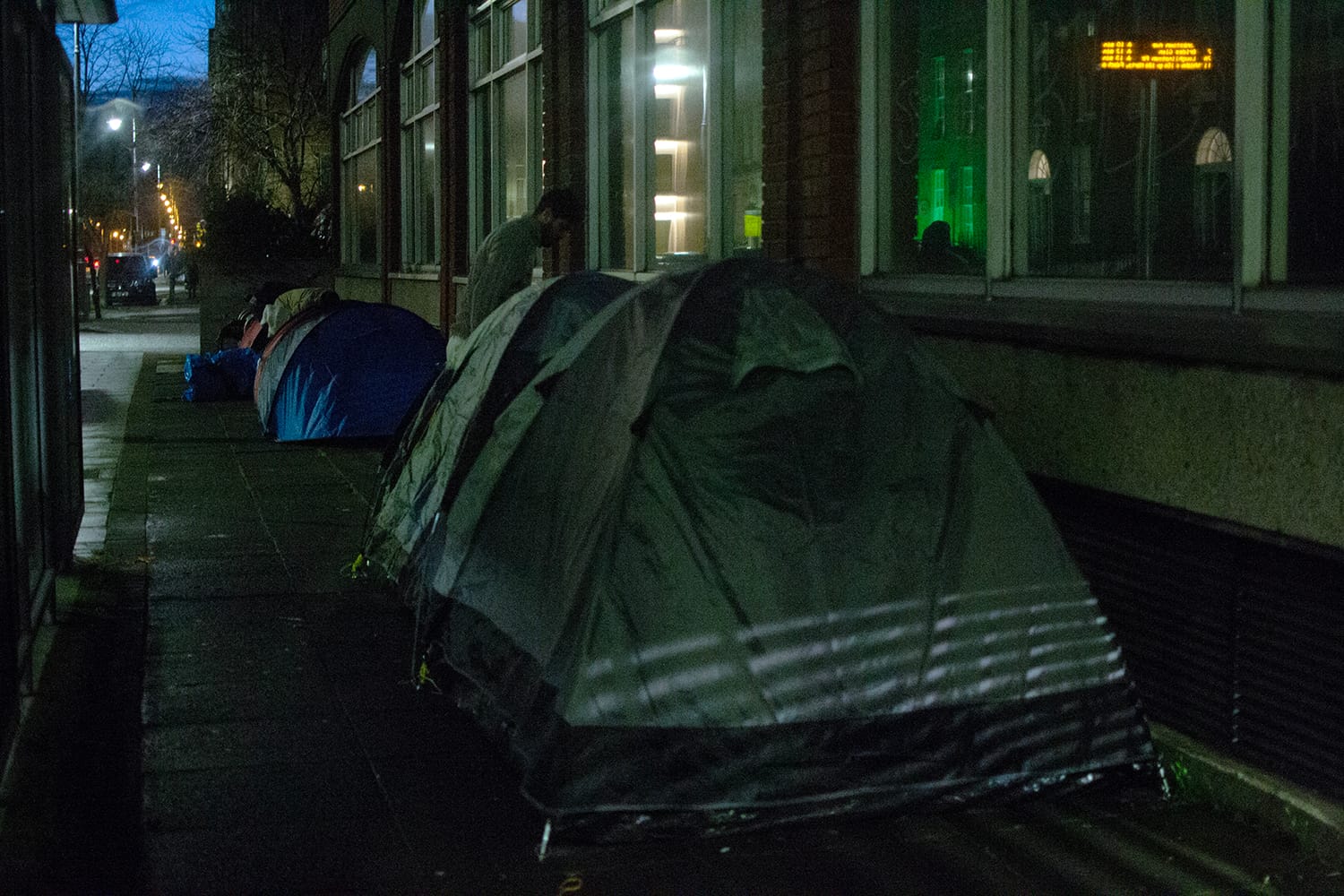What’s the best way to tell area residents about plans for a new asylum shelter nearby?
The government should tell communities directly about plans for new asylum shelters, some activists and politicians say.
On Saturday evening, a group of guys put together a modest meal to break their Ramadan fast: yogurts, fruit and bottled water on a Tesco bag on the ground.

Mahmoud Al-Azab wanted out of the camp at Crooksling, he said on Saturday evening. “It was very bad,” said Al-Azab, an unlit cigarette between his fingers.
A few guys around him were pitching up new blue and grey tents along the footpath outside the International Protection Office (IPO) on Mount Street Lower.
That morning, just a day before St Patrick’s Day, Al-Azab and dozens of other homeless guys seeking asylum were bussed out of the city.
“They ordered us to go to South of Dublin,” said Al-Azab, who is Palestinian with Jordanian citizenship.
Officials in the International Protection Accommodation Services (IPAS) – the office within the Department of Children and Equality in charge of housing asylum seekers and refugees – had decided to move them to tents on the grounds of an old nursing home in Crooksling.
Crooksling is about 12 miles south-west out of the city. St Brigid’s Nursing Home, surrounded by hills and skinny trees, was the target of an arson attack in February.
On Saturday morning, about 20 anti-immigrant protestors huddled outside its gates. Some hid their faces with balaclavas.
A few asylum seekers stood on the other side, gazing back at them. A handful of gardaí hung back nearby.
Every time anyone tried to slip out of the nursing home grounds and leave, protestors hassled them. A young boy with a big camera would rush them, jumping in front of them to take their photo. Masked men met them with abuse.
At one point, a Black man wheeled his belongings out of the old nursing home, head down. One of the masked protestors told him he didn’t belong in Ireland.
When Al-Azab tried to leave the site with some others, a masked man confronted them, a video shows.
“Go home, go home, our kids is gonna suffer because of all this,” the man shouts. “Fuck off back home,” he shouts, again and again, at them.
Al-Azab gets closer, trying to calm the situation, motioning to leave.
He and the other people he was with staggered towards the city after that, a long stretch of the way back on foot, says Al-Azab.

It was colder to sleep in tents in Crooksling, and its bathrooms weren’t ready when they got there. Besides, it’s so much further away from homeless support services, said Al-Azab.
It’d be an hour and a half by bus to get back from Crooksling to Tiglin on Pearse Street, for example, according to Google Maps.
A spokesperson for the Department of Children and Equality said the move wasn’t connected to St Patrick’s Day celebrations. The Crooksling location was chosen as it was free for use right away, they said, and “in the context of emerging public health and safety risks at Mount Street”.
Security has been beefed up at the Crooksling site since the arson attack, the spokesperson said.
As of 19 March, a little over 1,320 people seeking asylum were unaccommodated, according to official figures.
After the homeless men living on Mount Street had gotten on buses and left the city on Saturday morning, videos taken by locals showed a forklift lifting away their tents.
On Saturday evening, Mohammad Al Berrawi, one of the guys who had gone to the Crooksling camp and then left, was standing in a laneway near the IPO.
Around him, a few other Muslim guys fasting for Ramadan were preparing to sit together for a meal. They had placed dates, bananas, tangerines, other snacks and bottles of water on a big Tesco bag and a paper towel, ready for Iftar – the meal with which they break their daily fast.

Al Berrawi is real skinny, with sharp cheekbones. One of his fingers was bandaged. It had bled a little under the gauze.
The gates in Crooksling had been shut on his finger, he said. “The security guard told me no going outside.”
Mohammad Amocnai chimed in in English and Arabic. He had been sick sleeping rough, he said, and can feel himself descending into depression – but he’d rather stay put outside the IPO until he gets a bed, he said.
He had been in Crooksling too. “It was no good,” he said.
What’s it like in Crooksling for those who chose to stay comes in shards of information. Sometimes in voice memos and texts in Arabic.
Al-Azab, the Palestinian man who chose not to stay there, said the shower and toilets there weren’t quite ready on Saturday.
Last Wednesday, Fine Gael TD and Taoiseach Leo Varadkar, who was in the United States ahead of St Patrick’s Day, told reporters that he would say to people travelling through European countries but thinking of coming to Ireland that the government here can’t guarantee them accommodation.
Asylum seekers are often denied freedom of choice and are judged harshly when attempting to find a place they feel more comfortable living in.
Under EU law, those fleeing the conflict in Ukraine can freely move across the zone and choose to settle in a country they like best.
Others escaping violence in the Middle East are expected to stay where they first landed, even if they qualify for refugee status.
Daniel Sohege, the director of Stand for All, a human rights advocacy and support organisation in the United Kingdom, says the current homelessness crisis among asylum seekers can be understood as part of a broader deterrence policy.
It is a common scene across Europe, he says. And, pointing to homelessness as a deterrent doesn’t even work, he says.
It just helps governments look tough on asylum for political gain, says Sohege.
“Most people seeking asylum don’t know about the asylum laws and policies of the country they’re going to seek asylum in,” said Sohege by phone on Tuesday.
People decide where to go sometimes based on family ties to a country or common languages, he said.
An internal September 2020 report by the UK’s Home Office suggests that harsher border control and reception conditions can force people to switch their country of destination.
But it also says that welfare policies don’t significantly shape people’s decisions to move.
“Many asylum seekers have little to no understanding of welfare policies and access to provisions,” it says.
The biggest factor underpinning people’s decision to move is a desire to live a better life, it says.
Deterrence policies make life more difficult and precarious for asylum seekers, Sohege said – but they won’t stop people from coming.
“They’re left destitute, which can lead to potential malnutrition, starvation in some cases, freezing when the weather gets cold,” he said.
On Saturday evening, an Afghan guy standing near the IPO said he prefers to sleep rough on Mount Street.
Even though, he said in Persian, it makes him feel vulnerable and too visible to people who come to take their photos for social media.

Some activist groups had called for a protest at the IPO site for 19 March. “HOMES NOT TENTS OPEN UP EMPTY BUILDINGS”, reads the poster, which was floating around on activist WhatsApp groups.
Last Wednesday, before the move to Crooksling, a group of homeless Arab asylum seekers complained about slogans in English that were sprayed on their tents without their consent.
“These are phrases that we don’t understand,” said one of them via Google Translate, who said he didn’t want to be named because of his profile and fear of being tracked down by government officials in the country he had fled.
On Saturday evening, despite lingering activists and reporters, the guys who had returned to the city had begun wearily settling back into old routines.
By 8pm, some were already slipping inside their tents to rest.
Get our latest headlines in one of them, and recommendations for things to do in Dublin in the other.